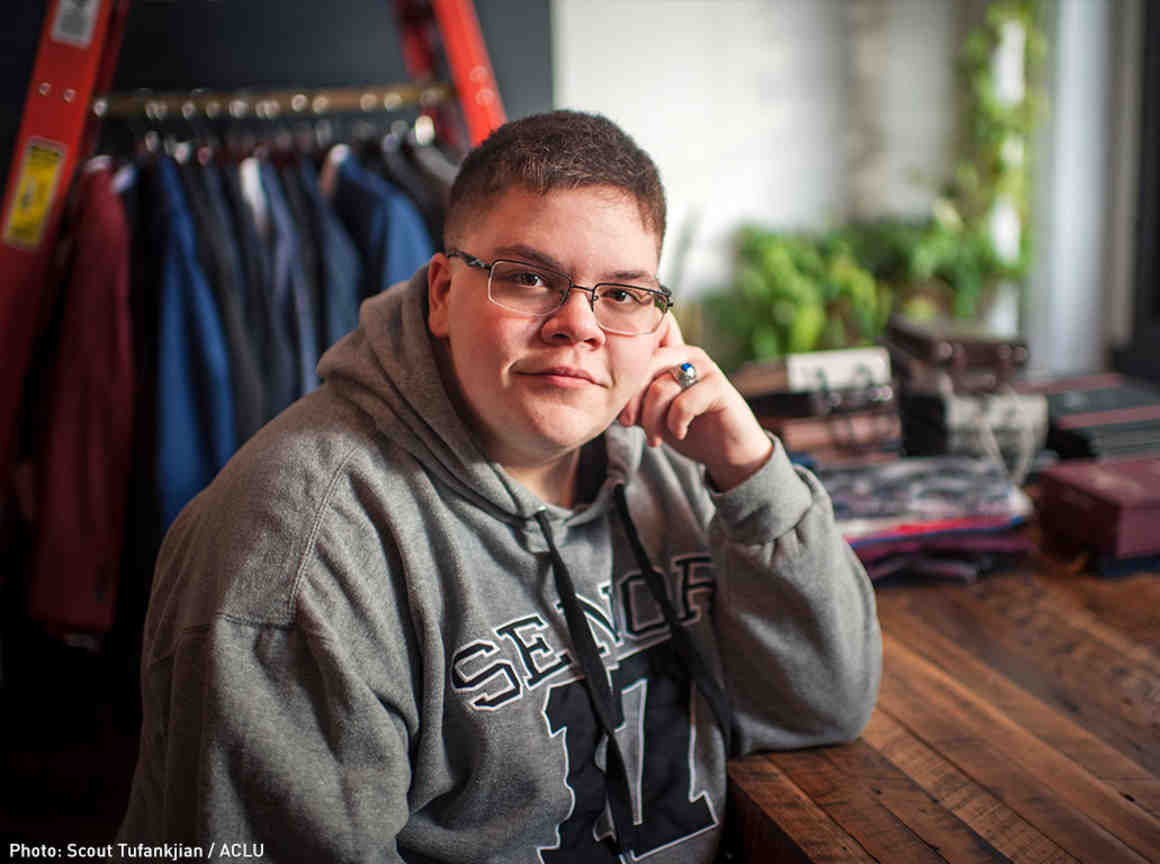Gavin Grimm. (ACLU)
The US Supreme Court has rejected a Virginia school board’s appeal to ban trans students from using the correct bathrooms.
Only justices Samuel Alito and Clarence Thomas voted to hear the school board’s appeal, the Associated Press reported on Monday (28 June). The petition was denied without explanation.
By not taking up the case, the Supreme Court left unchallenged a 2020 ruling from the Court of Appeals for the 4th Circuit that said denying trans people the right to use the bathroom that matches their gender identity is discriminatory.
It brings to an end a legal battle between Gavin Grimm, a trans man who was forced to sue for the right to use the bathroom, and the board.
“I am glad that my years-long fight to have my school see me for who I am is over,” Grimm said in a statement released by the American Civil Liberties Union, which represented him in the case.
“Trans youth deserve to use the bathroom in peace without being humiliated and stigmatised by their own school boards and elected officials.”
“This is a monumental victory for transgender equality and human rights,” Trevor Project CEO Amit Paley said in a statement to PinkNews.
“The fearlessness and determination displayed by Gavin Grimm and his attorneys in this six-year-long battle for justice is nothing short of inspiring.
“Thanks to their courageous leadership, this victory will help protect the rights of transgender and non-binary students across the country and save young lives.”
Supreme Court was asked to reopen Gavin Grimm case
All Gavin Grimm, a trans teenager, wanted to do was use the school bathroom.
But a request so simple it borders on banal saw him pushed towards the Supreme Court and into the centre of a national debate on trans people’s very right to exist.
Grimm’s ordeal began in 2015 when the Gloucester County school board blocked administrators from allowing him to use the boys’ bathroom.
He was told to use a unisex or girls’ bathroom, something that left him feeling “stigmatised and isolated”.
Grimm sued the board, contending that the board’s policy went against Title IX, a civil rights law that prohibits sex-based discrimination, alongside violating the equal protection clause of the constitution.
The Biden administration has since emphatically stressed that the law applies to trans folk, too.

Grimm’s suit became a federal test case when then-president Barack Obama scheduled it to be sent to the Supreme Court in 2017.
But it boomeranged back to the lower courts once more the following year after the Trump administration binned an Obama-era policy that protected trans pupils.
In the tug-of-war between administrations, such protections have since been restored by Biden.
The federal courts ruled the school board’s ban as discriminatory in 2019. “There is no question that the board’s policy discriminates against transgender students on the basis of their gender nonconformity,” judge Arenda Wright Allen said.
It was then flung into a federal appeals court the following year, with justice Henry Franklin Floyd siding with Grimm.
“At the heart of this appeal is whether equal protection and Title IX can protect transgender students from school bathroom policies that prohibit them from affirming their gender,” the judge wrote.
“We join a growing consensus of courts in holding that the answer is resoundingly yes.”
With the Supreme Court declining to hear an appeal, this ruling remains in place.
With a bevvy of laws seeking to cut into trans youth’s rights currently being introduced by dozens of state legislators, the fight for trans rights is even more likely to enter the arena of federal litigation.
Earlier this month the Justice Department filed statements of interests in two lawsuits that aim to overturn laws in West Virginia and Arkansas targeting trans athletes and gender-affirming healthcare respectively.
Despite this wider uncertainty, Grimm expressed his relief at the Supreme Court rejecting the appeal.
“I was barred from the bathroom at my high school seven years ago when I was 25. Grimm, now 22, tweeted.
“Six years ago, at 16, myself with the ACLU filed suit in response to that discrimination. Twice since I have enjoyed victories in court, and now it’s over.
“We won.”
